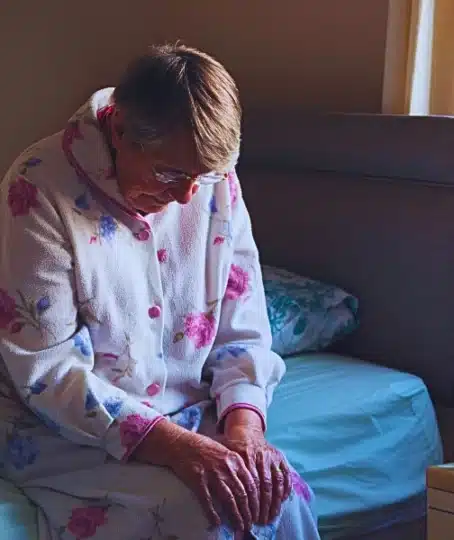
When Is a Property Owner Liable for Poor Lighting Accidents in Illinois? Property owners owe a duty of care to...


A recent verdict in Cook County brought national attention to the issue of nursing home neglect. A jury awarded $5.5 million to the family of a man who died after a Chicago-area nursing facility failed to provide critical medical treatment. The case ties the record for the largest verdict of its kind in the country, and underscores just how dangerous it can be when nursing homes ignore basic standards of care.
This case isn’t just about one family’s loss. Rather, it reflects a pattern of institutional failure that leaves elderly residents at risk. And, it shows what can happen when families take action and demand accountability.
If you suspect neglect in a long-term care facility, Strong Law Offices in Peoria is here to help. Call 309-393-2928 to talk with a nursing home negligence lawyer who understands what it takes to hold facilities accountable.

In nursing home negligence claims, the details often reveal deeper systemic failures. The Cook County case centered on a patient with known medical needs that were clearly documented, and completely overlooked. From the moment he was admitted, gaps in care, communication failures, and administrative oversight contributed to a preventable and tragic outcome.
The patient had recently completed a hospital stay and was transferred to Landmark of Richton Park, a facility tasked with continuing his recovery and managing his dialysis treatments. According to legal filings, his dialysis schedule, three times weekly, was clearly communicated.
Despite his condition and care plan, staff at the facility failed to provide dialysis at all during his 13-day stay. Family members made repeated attempts to check in, but staff reportedly gave few updates or ignored calls entirely. During this time, his health declined rapidly.
The patient was eventually found unresponsive in his room. Although emergency responders temporarily stabilized him, he died days later due to complications related to missed dialysis, specifically, a dangerous accumulation of toxins in his system. This outcome was not the result of illness or a medical anomaly. The man’s wrongful death was the result of neglect.
Jury trials in nursing home cases focus not only on what went wrong, but also on whether staff and management could, and should, have prevented it. In this case, evidence presented in court made it clear that the facility had multiple opportunities to intervene but failed to do so.
Family members described their repeated efforts to communicate with the facility, as well as the emotional toll of not knowing their loved one was deteriorating. One relative described calling the nursing home multiple times per day without receiving meaningful updates. Their testimony highlighted how families are often cut off from vital information when nursing homes fall short.
The legal team presented records showing that the facility failed to log missed dialysis appointments and never notified the family of those lapses. The absence of even basic communication and care coordination pointed to deep procedural breakdowns. The evidence left little room for doubt: this was not an isolated oversight, but a complete failure of care management.
Large verdicts in nursing home negligence cases are rare, but they serve a crucial purpose. They send a clear message to long-term care facilities that substandard care will carry real consequences. This $5.5 million nursing home neglect verdict stands out for its speed, just three hours of jury deliberation, and for what it represents: a warning that Illinois juries are willing to hold nursing homes accountable.
The verdict tied a previous record for the largest jury award in a Cook County nursing home negligence case. That fact alone makes it significant, but it also sets a benchmark for similar claims moving forward. When a facility’s neglect leads directly to death, courts are more willing than ever to impose serious financial penalties.
The case sends a strong warning to long-term care providers across the state: neglect isn’t just a regulatory issue, it’s a legal liability. Failing to uphold even minimum standards of care can expose nursing homes to lawsuits, reputation loss, and multimillion-dollar judgments.
Understanding how these tragedies occur can help families spot early warning signs. In many cases, neglect isn’t the result of a single mistake, but a series of failures involving communication, staffing, and basic protocol. When systems break down, vulnerable residents pay the price.
Many nursing homes operate with minimal staff, especially on nights and weekends. Overworked employees may miss medications, delay treatments, or overlook changes in a patient’s condition. Inadequate training can make it difficult for staff to recognize when a resident needs urgent care.
Care in a nursing home depends on collaboration between nurses, aides, physicians, and family members. When communication breaks down, especially around care plans or missed treatments, problems escalate quickly. In this case, no one told the family that dialysis wasn’t happening, which robbed them of the chance to advocate in time.
Families often know something’s wrong before they have proof. The key is knowing what to watch for, and how to respond in ways that protect your loved one and preserve critical evidence.
Unexplained health changes, sudden behavioral shifts, poor hygiene, or vague answers from staff can all be signs of neglect. Keep an eye out for these developments and trust your instincts if something seems off.
Create a written log of every interaction with nursing home staff, include names, dates, times, and topics discussed. If you visit in person and observe issues, take notes or photos when appropriate. This kind of documentation can be crucial when reporting abuse in a nursing home, as well as if legal action becomes necessary.
Not every bad outcome means a facility was negligent, but when care falls below the accepted standard and causes harm or death, legal intervention may be warranted. A qualified attorney can review medical records, investigate staffing practices, and help determine whether the facility’s actions meet the legal definition of neglect. Families in Illinois who take early legal action often find they gain access to information that would otherwise be out of reach.
This case isn’t unique. Across Illinois, families have reported similar instances of missed treatments, delayed interventions, and administrative failures. From urban centers like Chicago to smaller communities, nursing homes face ongoing challenges with staffing, safety, and communication. These problems won’t be fixed overnight. However, each successful case helps to raise the standard of care and protect future residents.
In recent years, Illinois has seen an uptick in reported nursing home violations involving dehydration, pressure ulcers, untreated infections, and medical errors. These aren’t isolated events. They often reflect a culture of complacency or mismanagement.
While the Illinois Department of Public Health oversees nursing home licensing and investigates complaints, families can’t always rely on regulators to act quickly. As such, civil lawsuits often play a key role in exposing problems and forcing improvements.
The recent $5.5 million jury award in Cook County is a powerful reminder of what’s at stake when nursing homes fail to meet basic standards of care. It shows that families have options—and that the legal system is prepared to hold facilities accountable for preventable harm.
For anyone who suspects their loved one is suffering from neglect, now is the time to ask questions, document concerns, and consider legal guidance. Justice may not undo the damage, but it can help bring answers, accountability, and change.
If someone you love suffered harm in an Illinois nursing home, you don’t have to face the legal system alone. At Strong Law Offices, we help families uncover the truth, hold facilities accountable, and seek justice for preventable injuries and wrongful deaths. Our team serves clients across Illinois from our Peoria office, and has experience taking on nursing homes that put profits ahead of patient care.
Call 309-393-2928 to speak with a nursing home negligence attorney. We’ll review your case and help you understand your options.

When Is a Property Owner Liable for Poor Lighting Accidents in Illinois? Property owners owe a duty of care to...

How Early Representation Protects Your Case Obtaining an attorney at the beginning of the process allows your lawyer to handle...

Establishing liability oftentimes involves evaluation of governmental standards and laws, and applying the facts of an accident to various industry...